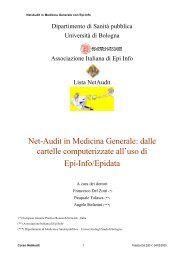What is clinical governance? - R@cine
What is clinical governance? - R@cine
What is clinical governance? - R@cine
Create successful ePaper yourself
Turn your PDF publications into a flip-book with our unique Google optimized e-Paper software.
<strong>What</strong> <strong>is</strong><br />
<strong>clinical</strong> <strong>governance</strong>?<br />
d<strong>is</strong>eases, work in a safe environment (eg,<br />
COSHH) and are helped to keep up to date are<br />
important parts of quality assurance. In the<br />
past, the levers to ensure good practice have<br />
been stronger in NHS Trusts than in primary<br />
care, and it <strong>is</strong> anticipated that the <strong>clinical</strong><br />
<strong>governance</strong> framework will encourage wider<br />
d<strong>is</strong>semination of good practice.<br />
● R<strong>is</strong>ks to the organ<strong>is</strong>ation: poor quality<br />
<strong>is</strong> a threat to any organ<strong>is</strong>ation. In addition to<br />
reducing r<strong>is</strong>ks to patients and practitioners,<br />
organ<strong>is</strong>ations need to reduce their own r<strong>is</strong>ks<br />
by ensuring high quality employment<br />
practice (including locum procedures and<br />
reviews of individual and team performance),<br />
a safe environment (including estates and<br />
privacy), and well designed policies on<br />
public involvement.<br />
Associated organ<strong>is</strong>ations, such as GP<br />
cooperatives, community pharmac<strong>is</strong>ts and<br />
residential care homes, should be covered by<br />
the <strong>clinical</strong> <strong>governance</strong> framework by<br />
agreeing to comply with the standards of the<br />
organ<strong>is</strong>ations that they are associated with.<br />
The contracting framework of the internal<br />
market encouraged Trusts to comply with the<br />
above elements. The development of PCGs<br />
and Primary Care Trusts should produce a<br />
more systematic response to these <strong>is</strong>sues in<br />
primary care.<br />
Research and development<br />
Good professional practice has always<br />
sought to change in the light of evidence<br />
from research. The time lag for introducing<br />
such change can be very long – for example,<br />
the use of thrombolytic agents in acute<br />
myocardial infarction took more than<br />
20 years from the first evidence of<br />
effectiveness to becoming establ<strong>is</strong>hed medical<br />
practice. Reducing time lag and associated<br />
morbidity requires emphas<strong>is</strong> not only on<br />
carrying out research, but also on using and<br />
implementating research.<br />
Techniques such as critical appra<strong>is</strong>al<br />
of the literature, project management<br />
and the development of guidelines,<br />
protocols and implementation strategies<br />
are all tools for promoting implementation of<br />
research evidence. The development of<br />
research practices and research networks in<br />
primary care, along with the national research<br />
and development programmes, such as<br />
the health technology assessment programme,<br />
and dedicated research support through<br />
Culyer funding, are promoting research in<br />
operational practice into areas of agreed<br />
national priority.<br />
Openness<br />
Poor performance and poor practice can too<br />
often thrive behind closed doors. Processes<br />
which are open to public scrutiny, while<br />
respecting individual patient and practitioner<br />
confidentiality, and which can be justified<br />
openly, are an essential part of quality<br />
assurance. Open proceedings and d<strong>is</strong>cussion<br />
about <strong>clinical</strong> <strong>governance</strong> <strong>is</strong>sues should be a<br />
feature of the framework.<br />
Corporate and <strong>clinical</strong><br />
<strong>governance</strong><br />
The new statutory duty for quality described<br />
in the white paper required the <strong>clinical</strong><br />
<strong>governance</strong> lead practitioner to be<br />
accountable to the chief executive (the<br />
accountable officer) of the Health Authority<br />
or NHS Trust. The line of accountability for<br />
<strong>clinical</strong> performance <strong>is</strong> therefore linked to the<br />
corporate <strong>governance</strong> accountability lines at<br />
th<strong>is</strong> level. In addition, the processes for<br />
openness, learning from and review of<br />
performance, and accountability for the use<br />
of power and resources are all part of both<br />
<strong>clinical</strong> and corporate <strong>governance</strong> systems. In<br />
the future, it would seem logical for corporate<br />
and <strong>clinical</strong> <strong>governance</strong> to become even more<br />
closely integrated.<br />
Next steps<br />
All NHS organ<strong>is</strong>ations have nominated a<br />
clinician with lead responsibility for <strong>clinical</strong><br />
<strong>governance</strong>, who reports to the chief<br />
executive and the board on all aspects of<br />
<strong>clinical</strong> quality. These clinicians will be<br />
assessing the state of readiness of the<br />
organ<strong>is</strong>ation for <strong>clinical</strong> <strong>governance</strong>, and<br />
will be working with colleagues to produce<br />
a plan of action for implementing the<br />
local framework.<br />
The plan will need to be developed as part<br />
of the corporate planning process and will<br />
therefore be linked to the health<br />
improvement programme, practice<br />
development planning, and organ<strong>is</strong>ational<br />
6
















